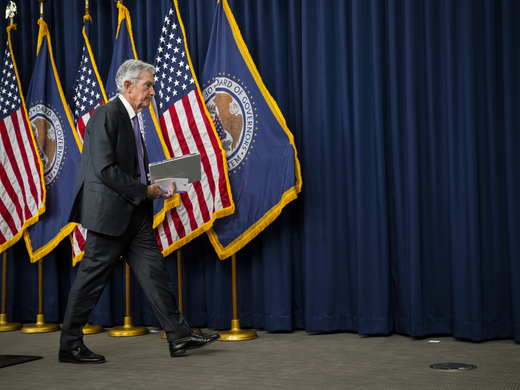Bank of Canada Deputy Governor Timothy Lane rarely speaks in public. The longest serving member of the Governing Council has given only 14 speeches since his appointment in February 2009, or about two per year.
But on the occasions Lane decides to grace an audience, he often makes an impact. Last week, Lane’s carefully considered analysis of the economic impact of the plunge in oil prices informed a good deal of reporting. His conclusion that $50 oil would be “bad for Canada” was hard to ignore. The Bank of Canada has a new reason to leave interest rates low for longer.
I read Lane’s speech as a statement of failure. Not on the part of Lane or the Bank of Canada, but rather Canadian economic policy in general. The reason that the plunge in oil prices is “bad for Canada” is because the country once again has missed an opportunity to diversify its economy. Canada faces a difficult road because it failed to hedge against its bet of becoming an energy superpower.
There is a section of Lane’s speech, that, if removed from its context, reads like a description of an economy that is about to achieve liftoff.
The deputy governor highlights Canada’s unambiguous good fortune of having a major trading partner within a relatively short distance whose economy is growing at annual rates in excess of 4 per cent and creating more than 200,000 jobs per month. Lane noted that the sharp drop in energy costs should lead to increased consumption in Canada and big economies that import most of their oil, such as the European Union and China. The later could help lift the global economy out of its funk, which would be good for investment and business confidence. At the same time, the value of the Canadian dollar has fallen 10 per cent in the last six months, a nice fillip to bottom lines of companies that do business abroad.
These are the conditions for the revival in exports that Bank of Canada Governor Stephen Poloz has been seeking since his appointment in 2013. And of course, there will be a boost in shipments abroad thanks to stronger US demand, a weaker currency and lower energy costs. It just won’t be enough to offset the blow from the crash in oil markets. Forget all that talk you heard after the financial crisis of Toronto becoming a global financial centre and Canada’s relative financial stability forming the foundation of a new competitive advantage. The country went all in on oil and gas — and for the foreseeable future will be paying a price for it.
Finance Minister Joe Oliver’s decision last week to delay the federal budget had the appearance of panic, even if it was a good idea. Prime Minister Stephen Harper’s playhouse is wrecked. Balancing the budget no longer will be easy. The frivolous decision to allow some families to split their taxable income between spouses now looks dear. Mr. Harper and his senior cabinet ministers portray themselves as the most capable stewards of the economy. What they choose to do with the time they've bought by delaying the budget will determine the extent to which their boast is true.
At the outset of this period of reflection, there is reason to worry. The Harper government appears welded to its pledge to record a surplus in 2015. A few days before Mr. Oliver delayed the budget, he was reciting Ottawa's central economic policy for the past two decades: we will balance the budget, period.
Ottawa remains trapped in an outdated way of thinking. Let’s recall why Canada put fiscal surpluses on par with universal healthcare and free trade. The country was going broke. The editors of prominent international business publications were making fun of us. The currency was weak. Debt was dangerously high. Canada had only one choice: fix its finances, come hell or high water. That was the policy prescription the International Monetary Fund (IMF) was advocating around the world. Canada embraced it.
This isn’t the backdrop today. The federal government is one of the few sovereigns that survived the financial crisis with its triple-A credit rating intact. Canada now is lauded in the business press as one of the better places in the world in which to invest. Canada’s federal debt is only about 30 per cent of gross domestic product. Yet despite all that, the economy lacks momentum. It is advancing, but only slowly. And that was before oil prices crashed. At the very moment the economy needed a jolt, it instead ran into a severe headwind.
It is difficult to see how a balanced budget will mitigate the situation. An enthusiastic adopter of the IMF’s best thinking two decades ago, Canada’s government now is ignoring the fund’s best advice. The IMF in the fall said countries with the means should take advantage of low interest rates to borrow and invest in infrastructure projects. The boost to economic growth now and in the future would more than offset the cost of borrowing, especially at a time when a country such as Canada can obtain 50-year loans at interest rates of less than 3 per cent.
Canada has a unique opportunity to make the type of once-in-a-generation investments that could reshape the contours of the economy. The Harper government is actually doing many of the right things. It is spending on infrastructure, including a new bridge between Windsor, Ontario and Detroit. It is putting up venture capital and is pushing harder to break into new markets. It has eased tax rates for smaller businesses. Given the mediocre state of the economy, Ottawa should be attempting to do more, not less.
Yet as long as a balanced budget remains the bedrock of economic policy, there will be an unnecessary restraint on ambition. One of the greatest barriers to coaxing Canada’s cautious entrepreneurs to seek opportunity abroad is fear of the unknown. The federal government could address this by adding to its number of trade commissioners. An aggressive effort to break into new markets could pay dividends down the road. However, one can imagine such an idea being nixed in the name of balancing the budget.
International investors could care less whether the federal government records a small deficit or a small surplus: the difference is inconsequential. The advocates of an unwavering commitment to surpluses argue a hard target is necessary to avoid sliding down a slippery slope that leads to a return of profligacy. That assumes voters can’t tell the difference between wasteful spending and a rare opportunity to reshape the economy. Canadian politicians love to say their fiscal prudence simply reflects the values of households who work hard to get the family finances in order. They seem not to have noticed that those prudent households over the past several years have taken advantage of a once-in-a-lifetime opportunity to borrow at ultralow rates to buy houses and run up debt.
There was one other Canadian development that caught my eye last week. Alberta Premier Jim Prentice said he is open to introducing a sales tax to make up for lost revenue from the collapse in oil prices. Alberta is the only Canadian province that doesn’t levy a sales tax, a considerable point of pride and competitive advantage. Yet it is noteworthy that Mr. Prentice is at least willing to consider whether his province’s economic orthodoxy fits with the times. One hopes his former colleagues in Harper’s cabinet are open to doing the same.


